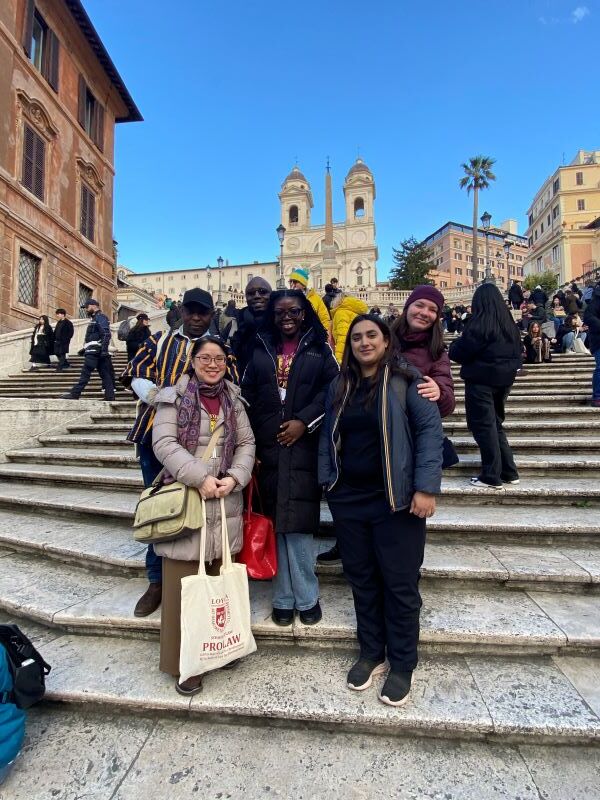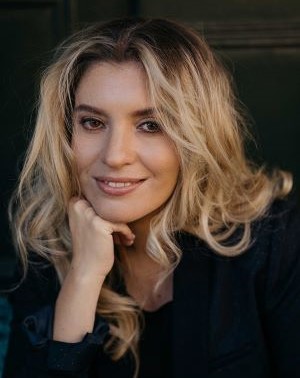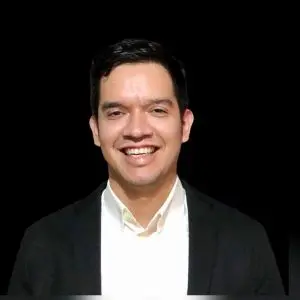Have you wondered what career awaits you as a foreign-trained attorney with an LL.M. earned in the United States?
An LL.M. degree is more than an academic achievement. It’s a strategic step toward a meaningful legal career inside or outside the U.S. It opens doors to career opportunities that support justice, development and good governance.
Vanessa Caruso is an administrative specialist for Loyola University Chicago School of Law’s Rule of Law for Development program, also known as PROLAW.
“The additional educational experience gained from an LL.M. provides the steppingstone to the next chapter of your legal career,” Caruso said. “Be willing to learn and step outside your comfort zone to experience life on a global level with a career that makes you happy.”
She said the world is ever-changing and new career paths continue to emerge.
“Look at the possibilities and imagine yourself in another part of the world or returning to your country to make a difference is your area of expertise,” Caruso said.

Law for Development Program, known as PROLAW,
does in-person study at Loyola’s John Felice Rome
Center in Italy.
At Loyola Chicago, students can pursue an LL.M. in Rule of Law for Development. It’s a hybrid program with online classes in the fall semester and in-person study in the spring semester at Loyola’s John Felice Rome Center in Italy.
“The PROLAW program equips students, many of whom come with prior legal and professional experience, with the practical skills needed to design, manage and implement legal reform projects,” Caruso said. “Graduates are candidates for roles in government ministries, international organizations, nongovernmental organizations and development agencies.”
She said some LL.M. graduates return home to serve as legal advisers, judges or policymakers, while others stay on in the U.S. or move elsewhere, contributing to global justice efforts through work with institutions such as the United Nations, World Bank or regional development organizations.
Yet the career path of an LL.M. graduate isn’t always a straight one.
“Immigration and licensure considerations, funding constraints and shifting global priorities can shape career trajectories in unexpected ways,” Caruso said. “Still, PROLAW alumni consistently find ways to apply their expertise, whether by leading legal reform in post-conflict regions, advising on anti-corruption strategies or supporting justice initiatives in marginalized communities.”
A career in the U.S.
Rita Powolot was born in Ukraine and moved with her family to Germany when she was 16. In Germany she attended law school at University of Münster.
“Germany has a complex legal education system to earn your law license,” Powolot said. “It’s two state examinations after meeting the requirements for each. It’s much like doing an externship rotation among different stations or companies.”
Powolot was stationed with a global law firm in Berlin when she passed the second examination and received a job offer from that firm, focusing on mergers and acquisitions. Three years later, she was offered an in-house position with a German automotive supplier and made a transition. Then, in 2020, that job led to a position with the leading global automotive supplier, Bosch, working in Stuttgart, Germany.
“I was working on vertical projects like autonomous driving, and then the pandemic hit,” she said. “After the pandemic, I decided to pursue my dream of working internationally and decided to attend University of California, Berkeley, School of Law’s LL.M. program.”
Berkeley Law provided a hybrid approach to legal education that suited Powolot’s schedule.
“I was looking for a program that would allow me to continue working while advancing my legal career,” she said. “I spent about four months at Berkeley Law, and the rest of the LL.M. program was completed online.”
In 2021, Powolot graduated from Berkeley Law’s LL.M. program with a Dean’s Award and certificates in Business Law and IP Law.
“The IP and business law components of the Berkeley Law LL.M. were a great fit for me because my work at Bosch was becoming IP heavy, and I was also dealing with commercial M&A transactions,” she said. “The program allowed me to keep my job and graduate in parallel, combining the two worlds: work and school.”
Following Powolot’s graduation from Berkeley Law, her husband’s career led him to be relocated to California.

“In 2022, I spoke with my management team, and Bosch provided me with an opportunity to relocate to the U.S., and although I’m in Illinois and he’s in California, we make it work,” she said. “I’m grateful to my company for this move, and I believe the LL.M. from Berkeley Law tipped the scales in my favor.”
As part of Bosch’s in-house counsel in the U.S., Powolot has responsibility over various business units in the automotive sector with a focus on commercial transactions involving IP.
“Although the U.S. legal system is different from my own country, I understand business and how clients operate,” she said. “I know the products well and the needs of my clients.”
Powolot said she believes in pursing education to better one’s knowledge and career path.
“There are opportunities in the U.S. for foreign-trained lawyers,” she said. “Advance your career with additional education and embrace new technology, such as artificial intelligence, to make yourself an asset to your organization.”
She said it’s important to have an open mind with respect to job opportunities, no matter where the positions are located.
“There’s a German saying that life is better or greener on the other side, and while this is not always true, be willing to consider options,” she said. “Accept the challenge to change directions in your career and have a positive attitude.”
Powolot is now senior legal counsel at Bosch USA in Chicago, leading global commercial and M&A projects. She is also active in the tech area, focused on legal AI solutions as well as the legal framework for AI applications inside and outside Bosch.
A career in home country
Mexico is home to Pedro Misael Castillo Bravo and the place he has chosen for his career.
He earned his Bachelor of Law degree from Tecnológico de Monterrey in Monterrey, Mexico, and earned an LL.M. in Rule of Law for Development from Loyola Chicago. He is a fully licensed lawyer in Mexico.
Bravo is a reinsertion adviser at the U.S. Embassy in Mexico City. He also works as a contractor for SGI Global LLC, advising the corrections team on reinsertion programs in Mexico implemented by the penitentiary systems.
“As part of my duties, I advise on how the reinsertion programs can be strengthened,” he said.
Bravo said his legal education helped prepare him for his current role.

Castillo Bravo
“I discovered an area of interest to apply my knowledge and specialty in the penitentiary system and the law, particularly focusing on reintegration,” he said. “I decided to pursue an LL.M. to further myself in development projects, and the PROLAW program at Loyola Chicago was a good fit.”
Bravo said he encountered two main challenges along his career path.
“The first challenge was identifying what truly interested me in the law,” he said. “The legal profession is broad, and finding the right area of focus can take time.”
He said it took several years to realize that his passion was at the intersection of international assistance and the justice system.
“The second challenge was selecting the right tools to enhance my professional career,” he said. “For me, obtaining the PROLAW degree was the perfect choice, as it helped me navigate the complexities of the development field and highlighted other skills that I needed to work on to become a more effective professional in this area, such as using data analytics to assess and evaluate the impact of projects.”
Bravo noted two significant personal achievements.
“The first, which is very personal to me, was being invited to teach law as an adjunct professor at my former law school in Mexico, Tecnológico de Monterrey,” he said. “This institution is one of the most recognized universities in the country, making their invitation a significant milestone in my career.
“The second achievement was being in a position to design and collaborate on the selection of an organization to receive funding for a project implementation. Previously, I had worked on the other side of this equation, where I was the one seeking funds as a nonprofit professional. Transitioning to my current role and contributing to this process felt like a huge success.”
Bravo recommends that foreign-trained lawyers research the career options available to them inside and outside the U.S. and seek roles that align with their personal and professional interests.
“I currently have 12 years of experience in managing international cooperation projects as a Mexican lawyer,” he said. “I see myself working mainly as a researcher and academic scholar, working on projects to improve the justice system in the Latin America region.”
Career diversity
Caruso has been the point person for Loyola Chicago’s PROLAW program for the past 10 years.
“It’s a hands-on program with a focus on skill building and not so much on foundational knowledge,” she said. “It’s being able to move a project forward as it relates to rule of law, including the monitoring and evaluation of projects.”
However, not all PROLAW graduates go into project management.
“PROLAW grads are employed across the board,” Caruso said. “It could be in governments, ministries or any other national authority, in the national judiciary or public justice institutions, including multilateral international organizations or peacekeeping missions.”
Another option is to work with international consulting firms, although government funding could become an issue.
“These positions are heavily funded by USAID, so people currently in these positions may need to find other jobs to continue their career path, as funding from the U.S. may be frozen or eliminated under the current White House administration,” Caruso said. “And there are jobs available across the globe in multiple industries.”
Caruso shared the story of Brenda Anugwom, who earned her PROLAW LL.M. in 2012. It was written by Claire Zulkey for Loyola Chicago’s website, Loyola Today.
Anugwom grew up in Nigeria, where her father was an economist. Her uncle worked as a lawyer in the U.S.

“That was hammered into my head as a child,” she said. “I grew up thinking, ‘I’m going to go to law school.’”
And so she did.
After graduating from law school in Nigeria, she was drawn to the development sector.
“There’s just so much to be done,” she said. “I felt that all hands needed to be on deck.”
While Anugwom was working on development projects for the World Bank, a colleague told her about PROLAW at Loyola Chicago.
“I always wanted to get a master’s degree and saw it as an opportunity,” she said.
Her time in the PROLAW program helped fast-track her career, and the PROLAW network proved to be as beneficial as the curriculum.
“You are with people from all over the world,” Anugwom said. “There is no amount of money that can pay for international exposure. When you are with different people, you learn from them, you learn how they feel, and then it helps you become a better person. You learn how to talk to people better; you know how they react to things.”
After seeing a job opening posted on the PROLAW alumni LinkedIn page, Anugwom applied, and in 2022 she became the legal adviser and host country agreement representative for Médecins Sans Frontières/Doctors Without Borders in South Sudan.
In 2023, Anugwom became CEO of the Nigerian Women Trust Fund, a nongovernmental organization that advocates for more inclusive governance and against gender-based violence. There, she continues to make a difference in the lives of women and marginalized communities.
Editor’s Note: The views expressed by Pedro Misael Castillo Bravo are not necessarily those of the U.S. government.
This article appears in the 2025 digital issue of International Jurist.

